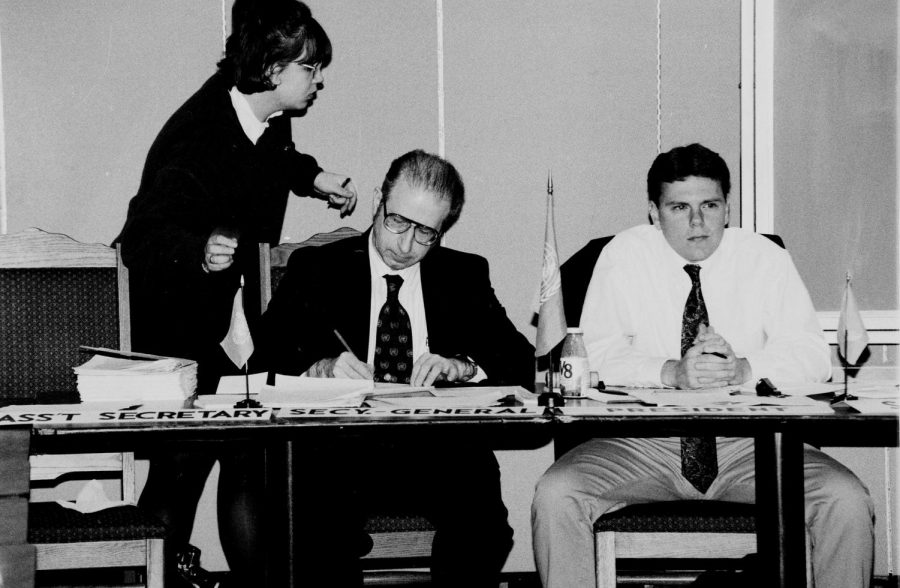Global impact: Late UWO international studies prof Kenneth Grieb’s legacy continues with professorship
November 1, 2021
For more than five decades, the late international studies professor Kenneth Grieb changed the lives of University of Wisconsin Oshkosh students through his classroom teaching and his mentorship as adviser to the best Model United Nations team in the nation.
“Dr. Grieb was relentless in his commitment to build and sustain a tradition of excellence,” said UW Oshkosh alumna Jessica King ’98, of Oshkosh, who represents the Grieb estate. “His legacy is felt at home and around the globe as his protégées use diplomacy, strategy and consensus-building to resolve problems in the private, government and nonprofit sectors.”
Grieb died in July 2018 at the age of 79.
With the recent establishment of the Kenneth J. Grieb Professorship through a bequest of more than $2 million, future generations of students will continue to benefit from top-caliber international studies faculty, such as UWO geographer Angela Subulwa, the first to receive the honor.
“Dr. Grieb and the Grieb estate wanted to ensure financial support for faculty pursuits to build competitive, world-class learning opportunities for students,” King said. “My hope is that future generations of students have the opportunity to develop their critical-thinking skills pursuing an interdisciplinary education.”
She added that UWO’s international studies curriculum explores the interrelated and interdependent nature of economic, social, cultural and political realities.
“A strong curriculum can only be maintained with dedicated faculty. This bequest builds the capacity of the faculty to develop global and non-Western course content and create experiences to prepare students for the future,” King explained.
Subulwa joined UWO’s geography department in 2008 and became the international studies program director in 2020. She first sensed Grieb’s impact when she began to recognize the quality of the students the two had in common.
One such student was UWO alumna Karee Orrick ’18, who doubled majored in international studies and geography. As an undecided, first-generation college student, she discovered her passion for geography in Subulwa’s world regional geography class during her first semester at UWO.
“Dr. Grieb really pushed and challenged me. Dr. Subulwa challenged me too, and also mentored and supported me. She and I really see the world in similar ways,” said Orrick, who is finishing up her master’s degree with the University of Kansas and working full time as an environmental project manager in Denver.
Orrick sees the great value in Grieb’s professorship.
“I think it’s important for faculty and staff to be supported in their research and travels. It is essential to have engaged faculty. It’s the only way to bring those experiences back to the classroom,” she said. “When Dr. Grieb would talk about his experiences in class, we could listen for hours. It really changed the impact of our class readings. It opened up the world for students and brought the readings to life.”
Subulwa said Grieb truly understood that international studies faculty need to do field work and the only practical way for that to happen is during the summer months when professors have more time for their work outside the classroom.
“This professorship allows me to get into the field more frequently, consistently and for longer periods of time,” Subulwa said. “Then I can bring that back and have new information to share with my students and, perhaps, even design a new course.”
Her research is primarily concerned with the political, economic, developmental and cultural challenges that come with displacement in Africa.
This past summer, for example, Subulwa’s research supported by the Grieb professorship took her to the Mongu District of Zambia. She studied the barriers to accessing adequate and equitable sanitation and hygiene in the area, a component of the United Nation’s sustainable development goal.
Globally, just 39% of people have access to private toilets that safely dispose of waste.
“Not only is access lower in Sub-Saharan Africa than any other world region, but access is also lower for poor rural households than wealthy urban households. Zambia has very low levels of access,” she explained. “In 2017, 32% of its rural population lacked any type of toilet facility.”
In her project, Subulwa is seeking to understand perceptions toward different types of toilets, such as pit latrines, ventilated improved pit latrines, pour-and-flush system and flush toilets.
“Specifically, I am looking at whether economics alone explain why households lack a private toilet that safely disposes of waste or do personal preferences also influence decisions?” she said.
Tackling such crucial issues in the developing world is at the heart of international studies, Subulwa noted.
“I think Dr. Grieb knew what the impact a professorship for faculty could ultimately have on students. He was very clearly supporting international studies and trying to move the needle to help faculty get into the field and to bring that knowledge back to UW Oshkosh.”














